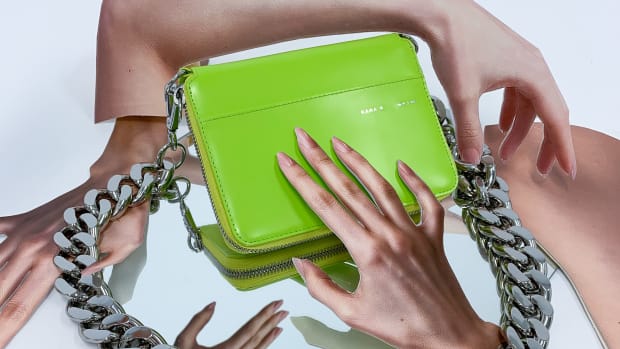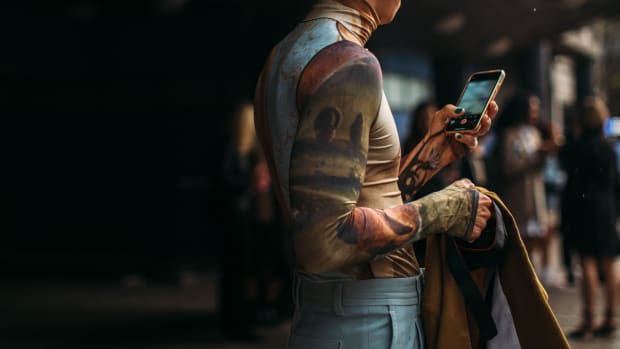The fashion trend cycle may seem to turn faster with each passing season, but it's often quite obvious when a new not-so-new aesthetic captures the moment. One of the biggest recent
examples was the mid-to-late 2010s' obsession with all things '90s, which saw Marc Jacob reissue his legendary '92 grunge collection at Perry Ellis and countless regurgitations throughout fast fashion. Now, without question, Y2K is the nostalgic moment that's taken a stronghold, specifically among Gen Z.
"Y2K nostalgia sells really well," confirms Natalia Spotts, founder of SoHo-based Funny Pretty Nice. "The year 2000 just had so many flattering silhouettes that you can't find now."
Spotts turned her personal love of thrifting into a business after quitting her previous job in 2019 and starting to sell vintage among friends. This led to an e-commerce site, pop-up shops (including a recent six-month stint in Westport, CT) and, eventually, a stand-alone store in New York City — soon to be two, with a flagship opening in March of 2022. And though her appreciation for '00s silhouettes may not necessarily resonate with consumers of all ages (such as those firmly in the high-rise-jeans-only camp), Spotts is finding success among her Gen Z peers thanks to her curation, as well as to how she uses social media to bridge likes and followers to IRL shoppers.
"I was a micro-influencer before I started Funny Pretty Nice," she says. "I had this community of girls who were already interested in vintage off the bat. Because I had that community I could reach, it spread really quickly."
Spotts' story is similar to several of her enterprising Gen Z peers who have also created a social-media-to-brick-and-mortar pipeline for selling vintage. It's demonstrating that this generation's appreciation for Ed Hardy shirts and Mudd Jeans isn't simply an indication of shifting tastes: It's shining light on how the future of vintage is being shaped by some of the youngest and most social media savvy entrepreneurs.
This new era of vintage is something that Jenna Gottlieb, Instagram's shopping editorial merchandiser, began noticing a little over six months ago. Along with TikTok — whose popularity famously erupted during the pandemic, reaching three billion downloads this past summer — Instagram and its Reels feature have been the biggest (and sometimes only) marketing tool helping to drive Gen Z vintage seller's present success, whether they already had significant followings or started from scratch.
"What's been cool to see is that retailers of all types are taking advantage of the features as a means to storytelling and bring products to life in a way that's incredibly animating and compelling," Gottlieb says. "In particular, when it comes to vintage or thrift styles, that market can be intimidating to shoppers. It's not the type of shopping people are used to or it feels a little more niche. The ability to utilize Reels and Stories to showcase these pieces feels accessible and fun and inspiring."
The intimidation factor rings true for Matthew Choon, the owner of Bowery Showroom. The New York native recalls walking into vintage streetwear stores in SoHo and feeling unwelcome: "I was mesmerized by the product, but I didn't feel like I could talk to anyone on staff or take any pictures. I felt like I was being stared at." Choon opened his own shop on the Lower East Side in April 2021, setting out to offer a different vibe. It's stocked with the work of emerging artists and designers, as well as a selection of vintage clothing and Choon's own CBD line, Potion.
Choon sees his business as an opportunity to "change the culture" around retail and vintage, and social media has been his biggest tool in creating an environment that peers and consumers feel not only welcome at, but invested in Bowery Showroom.
"That was really big for us: providing an experience for [customers] digitally and then giving them an opportunity to experience it physically. And make sure the experience itself is also worthwhile," he says. This digital experience specifically takes place across TikTok and Instagram Reels, before any exchange of currency.
Bowery Showroom employees — most between the ages of 19 and 21, according to Choon — have now become recognized social media personalities, offering up entertainment such as microhistory lessons on iconic brands, playful man-on-the-street interviews, previews of new arrivals and details on upcoming in-store events. "The process, the behind-the-scenes, the day in the lives — that's what Gen Z wants to see," he says, adding that the "previous generation's" use of picture-perfect, filtered images "doesn’t necessarily get Gen Z to stores." This past summer, Bowery Showroom received around 2,000 to 3,000 RSVP to each of its shopping events, thanks to its TikTok and Reels, with most attendees showing up and lining up around the blocks.
"If one of those particular videos goes viral, the conversion is extremely high," Choon says.
Recommended Articles
This ability to create a customer base across digital and IRL spaces suggests that the future of resale shopping — a market projected to be worth $84 billion by 2030, twice as much as that of fast fashion, according to ThredUp’s 2021 Resale Report — is Gen Z-led. Several other shared priorities and trends, according to experts and Gen Zers themselves, support this, namely an understanding of the importance of sustainability and an emphasis on experiential shopping experiences that foster meaningful community.
"The way Gen Zers are shopping now will forever be the way they shop," says Lediona (Ledi) Zharku, co-founder of Tired Thrift. "Once you're ethically conscious, it's hard to reverse that."
Together with her cousin and business partner Elona Zharku, Ledi opened Tired Thrift in Williamsburg in November 2020, specifically geared toward filling what they saw as an obvious lack in the market for Gen Z consumers and vintage products. "Even big-box sellers are incorporating vintage in their plans," she says, alluding to moves like Nordstrom partnering with Goodfair on an online vintage hub and Urban Outfitters launching its Nuuly Thrift offering this past summer. "Other retailers taking inspiration from smaller vintage stores shows the power of shopping sustainably."
Ledi says that businesses "need to be ethically conscious to attract Gen Z," and statistics suggest it, too: According to findings from the 2022 Instagram Trend Report, approximately 1 in 4 (or 23%) Gen Z consumers "are expecting to thrift more online through second-hand websites (ie: Depop and Poshmark)" in the coming year.
"Finding something that's yours and yours alone is so much of the appeal of vintage shopping," says Instagram's Gottlieb, explaining that choosing pre-worn purchases also makes consumers feel like they're being environmentally conscious. "It checks both those boxes."
These Gen Z business owners, among others selling products through Instagram and TikTok, are also representative of a new approach toward work and career, especially reflecting on the past couple of years.
"Throughout the pandemic, we've been tracking the rise in self-taught creatives and entrepreneurs who are buying vintage pieces and re-working them into one-off pieces," says Robbie Sinclair, creative director of youth at the trend forecasting agency Fashion Snoops. "Not only does this combat the wear-it-once-and-throw-it-away culture that we've seen for far too long, it also gives consumers more options to own special pieces that no one else has."
Furthermore, Spotts — who, in addition to selling vintage, launched her own Funny Pretty Nice clothing collection using recycled fabrics — believes that consumers are also more responsive to small, self-made businesses: "We're in the post-Girl Boss era," she says referring to the often toxic work cultures that have driven hugely successful brands in the past decade. "I feel like when Gen Zers see small businesses, they want to support."
As the future of vintage and second-hand shopping takes shape, one of the most common themes — even among sellers with tens of thousands of Instagram followers and millions of TikTok likes — is the importance of being offline. Social media is critical, but it’s also a means to build genuine in-person connections.
"Coming out of such a traumatic experience as the pandemic, we craved human interaction so heavily," says Tired Thrift's Ledi. The importance of its social presence can't be overstated: One of Tired Thrift's Instagram Reels, "day in the life of owning a shop in Brooklyn," was a huge success this past summer, garnering nearly 500,000 views; followers spiked after that. But they're not measuring success solely by these metrics.
"In order for retailers to attract Gen Zers to their stores, there definitely needs to be a sense of community and having fun," says Elona, explaining that Tired Thrift's monthly events serve this purpose and encourage peers to not only shop the store, but get a chance to hang out with the co-founders and team. "It's a combination of having really sick clothing but also having a place where you feel very comfortable."
Never miss the latest fashion industry news. Sign up for the Fashionista daily newsletter.



